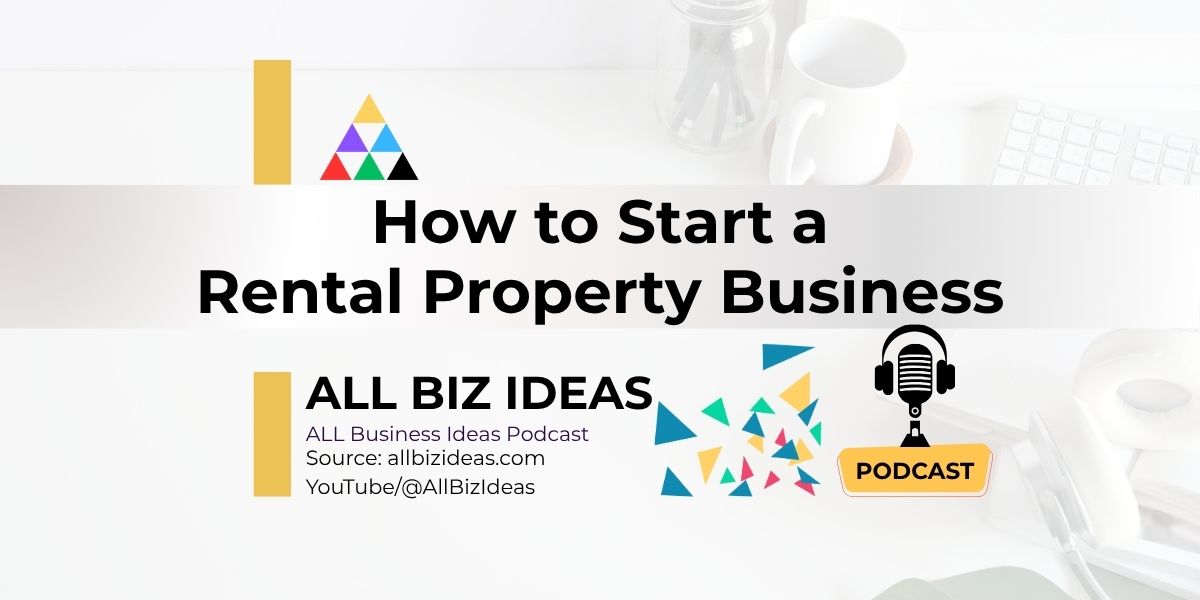How to Start a Rental Property Business? A Step-By-Step Guide
Here’s a realistic scenario for someone with limited capital looking to get started in how to start a rental property business, plus the steps they should take and common pitfalls to avoid.
Scenario: How to Start a Rental Property Business with Limited Money
Profile:
- Age: 30
- Savings: $15,000
- No prior real estate experience
- Moderate credit score (680–700)
- Employed full-time with stable income
🎯 Objective:
Generate passive income from rental properties long-term by starting small.
Frequently Asked Questions
1. What is a rental property business and how does it generate income?
A rental property business involves purchasing a property, such as a single-family home, multi-family building, apartment, or commercial real estate, and leasing it out to tenants. The income is generated through regular rent payments collected from these tenants. After deducting various expenses like property maintenance, insurance, taxes, and mortgage payments, the remaining income becomes the owner’s profit.
2. Is starting a rental property business with limited capital possible, and what are some strategies?
Yes, starting a rental property business with limited capital is possible. A common strategy involves improving your credit score and saving a modest amount of money (e.g., $15,000-$25,000). Then, consider starting with a “house hack” by utilizing government-backed loans like FHA, VA, or USDA loans, which often require lower down payments for owner-occupied properties. You can buy a duplex, triplex, or fourplex, live in one unit, and rent out the others. The rental income from the other units can significantly offset your living costs and mortgage. After a year of residing in the property, you can move out and rent your unit as well, turning it into a full rental property and using that income to save for future investments.
3. What are some key advantages of investing in rental properties for passive income?
Real estate rental properties offer several potential advantages for building passive income. These include generating steady cash flow through consistent monthly rent payments, the potential for long-term appreciation in the property’s value, significant tax advantages through deductions for mortgage interest, property taxes, depreciation, and operating expenses, acting as an inflation hedge as rents can rise with inflation, and the ability to use leverage (mortgages) to control a larger asset with a smaller initial investment.
4. What are some common pitfalls to avoid when starting a rental property business?
Several pitfalls can hinder success in a rental property business. It’s crucial to avoid underestimating repairs and maintenance costs, as even seemingly good properties can have hidden issues. Always budget a percentage of the rent (e.g., 10-15%) for maintenance. Buying in the wrong location is another significant risk; avoid areas with high crime, declining populations, or weak tenant demand, and prioritize locations with job growth, good schools, and growing populations.
Overleveraging, or taking on too much debt, can lead to financial strain even if a bank approves a loan. It’s important to calculate for positive cash flow after all expenses. Skipping professional help from experienced real estate agents who work with investors, good home inspectors, and real estate-savvy CPAs can lead to costly mistakes. Finally, understanding that it’s rarely 100% passive income is essential; you’ll still need to deal with vacancies, taxes, legal compliance, emergencies, and paperwork, even with a property manager.
5. How does a "house hack" scenario work and what are its benefits?
A house hack involves purchasing a multi-unit property (like a duplex, triplex, or fourplex) using an owner-occupied loan with a lower down payment requirement (such as an FHA loan with 3.5% down), and living in one of the units while renting out the others. The rental income from the other units can significantly reduce or even cover your monthly mortgage payment. The benefits include easier loan approval as an owner-occupant, a lower initial down payment, and the opportunity to gain hands-on property management experience while living on-site.
6. What are the different ways to finance a rental property investment?
There are various ways to finance a rental property investment. Traditional mortgages are common, typically requiring a 20% down payment for investment properties. Private lenders or hard money loans offer faster funding but usually have higher interest rates. Real Estate Investment Groups (REIGs) allow pooling funds with other investors. You can also use home equity loans if you already own a home. In some cases, seller financing may be an option, allowing you to purchase the property directly from the seller without traditional lenders.
7. What are the options for managing a rental property once acquired?
Once you’ve purchased a rental property, you have two primary management options: self-management or hiring a property management company. Self-management involves handling all aspects yourself, including finding tenants, collecting rent, managing maintenance and repairs, and addressing tenant relations. This can increase profits but requires significant time and effort. Hiring a property management company delegates these tasks for a fee, typically 8-12% of the monthly rent, freeing up your time but reducing your passive income.
8. Beyond traditional long-term rentals, what are other monetization strategies for rental properties?
Besides traditional long-term rentals with year-long leases, there are other strategies to monetize rental properties. Short-term rentals through platforms like Airbnb and Vrbo can potentially generate higher income, especially in desirable locations. Commercial rentals, while requiring a larger investment, can offer stable income through longer leases with businesses. Rent-to-own agreements allow tenants to eventually purchase the property, potentially providing higher rental income and a favorable sale price.
Guide on How to Start a Rental Property Business with Little Money:
- Improve Credit & Build Savings
- Goal: Boost credit to 720+ for better loan terms and save ~$20K+
- Why? Even low-down-payment loans require reserves (for emergencies, repairs, etc.)
- Start with a House Hack or Duplex (Owner-Occupied)
- FHA Loan: 3.5% down (requires you to live in the property for 1 year)
- Buy a duplex, triplex, or fourplex — live in one unit, rent the others.
- Example:
- $250,000 duplex → 3.5% down = $8,750 + ~$5K in closing costs = ~$14K total
- One tenant’s rent could cover 70–100% of the mortgage
Advantages:
- Easier loan approval as owner-occupant
- Lower down payment
- Learn property management hands-on
- Use Rental Income to Save for the Next Property
- After 1 year, you can move out and rent your unit — now it’s a full rental.
- Rinse and repeat with a second house hack or move into a single-family home.
- Consider Partnerships or Syndicates (if ownership isn’t urgent)
- If you can’t qualify for a loan or don’t want to manage property:
- Join a real estate syndicate (crowdfunding platforms like Fundrise, RealtyMogul)
- Or find a partner with capital — you manage, they fund.
How to Start a Rental Property Business -Common Pitfalls to Avoid
- Underestimating Repairs and Maintenance
- Even turnkey properties have hidden costs (HVAC, plumbing, appliances)
- Always budget 10–15% of rent for maintenance
- Buying in the Wrong Location
- Avoid areas with:
- High crime
- Flat or declining population
- Weak tenant demand
- Prioritize: growing cities/suburbs, job growth, decent schools
- Overleveraging
- Just because the bank approves you doesn’t mean you can afford it.
- Always run your own numbers for positive cash flow (after ALL expenses)
- Skipping Professional Help
- Use a real estate agent who works with investors, not just regular buyers.
- Get a good home inspector and possibly a real estate-savvy CPA.
- Thinking It’s 100% Passive
- Even with a manager, you’ll deal with:
- Vacancies
- Taxes
- Legal compliance
- Emergencies
- Paperwork
- It’s semi-passive at best — be mentally ready.
Ideas on How to Start a Rental Property Business with Little Money
- Example ROI from a Duplex House Hack
- Property Price: $250,000
- Down Payment: $8,750 (FHA 3.5%)
- Rent per unit: $1,200
- Mortgage (PITI): ~$1,900/month
- Live in 1 unit, rent other = $1,200/month → you pay $700/month to live
- After a year, rent both = $2,400/month
- Net cash flow after all costs: ~$400–$600/month
Summary: Path for Low-Capital Entry
Step | Action |
1 | Save $15K–$25K and improve credit |
2 | Use FHA/VA/USDA loan to house hack |
3 | Learn the ropes of managing tenants |
4 | Reinvest rental income into new properties |
5 | Scale slowly with better properties or partnerships |
More Frequently Asked Questions
What is Rental Property Business income?
Real estate rental income refers to the money earned from leasing out a property to tenants. The property owner (landlord) purchases a property (single-family home, multi-family building, apartment, commercial real estate) and rents it out to tenants. Rent payments are collected regularly (monthly or annually), and after deducting expenses like property maintenance, insurance, taxes, and mortgage payments, the remaining income becomes the owner’s profit.
Is Real Estate Rental Properties a Good Business for Building Passive Income?
Yes, real estate rental property investment can still be a good business for passive income — but with important caveats in today’s market. Here’s a balanced breakdown of why it can be good and what you need to watch out for:
Why Real Estate Rental Properties Business Can Still Be a Good Investment
- Steady Cash Flow
- Rental properties can generate consistent monthly income, especially in high-demand areas.
- Once stabilized (with long-term tenants and minimal vacancy), it can provide relatively passive cash flow.
- Appreciation Over Time
- Real estate tends to appreciate over the long term, meaning the value of your asset could grow while tenants pay down your mortgage.
- Tax Advantages
- Investors can deduct:
- Mortgage interest
- Property taxes
- Depreciation
- Repairs and operating expenses
- These deductions can significantly reduce taxable income.
- Inflation Hedge
- As inflation rises, rents often increase, boosting your income while your fixed mortgage payment stays the same.
- Leverage
- You can use borrowed money (a mortgage) to control a larger asset — which amplifies your return on investment (ROI) if managed well.
Challenges and Risks
- High Interest Rates
- Mortgage rates remain relatively high, which means:
- Higher monthly payments
- Lower cash flow unless rents are strong enough to compensate
- Property Prices Are Still Elevated in Many Markets
- In many areas, prices haven’t dropped significantly despite rate hikes, which can squeeze ROI.
- Rent Control and Regulation
- Some cities/states are implementing stricter rent control laws, which can cap income growth and add legal complexity.
- Maintenance & Management Costs
- Rising labor and materials costs = more expensive repairs.
- Hiring property managers cuts into passive income (typically 8–12% of rent).
- Tenant Risk and Vacancy
- Risk of non-payment, especially in uncertain economic climates.
- High turnover or long vacancy periods can erode profits.
Is It Right for You?
- Still a solid long-term investment in the right location and with good due diligence.
- Best if:
- You buy below market value
- You have positive cash flow from day one
- You plan to hold long term
- You’re willing to deal with some active management (or hire a good manager)
Pro Tip:
- Look at secondary markets (mid-size cities with growing populations and lower entry costs) rather than oversaturated, high-cost metros. Cash flow tends to be better, and you may find more favorable landlord laws.
How to Start a Rental Property Business as a Passive Income Stream: Detailed Guide
Why Real Estate Rental Properties for Passive Income?
Real estate is considered one of the safest and most stable forms of investment. Here are a few reasons why it’s ideal for passive income:
- Stable Cash Flow:
Rental properties typically provide a steady, reliable cash flow as long as the property is leased and tenants pay rent regularly. - Appreciation:
Over time, the value of real estate tends to increase. This means the property’s value can appreciate, offering an additional return on investment (ROI) when you decide to sell. - Leverage:
You can use financing (mortgages) to acquire property. This allows you to control a large asset with a relatively small initial investment. You can also use your rental income to cover the mortgage payments. - Tax Benefits:
Owning real estate provides several tax advantages, including deductions for mortgage interest, property taxes, maintenance, and other expenses. - Equity Building:
With each mortgage payment, you’re building equity in the property. Over time, the property becomes an asset you own outright. - Inflation Hedge:
Real estate can act as a hedge against inflation. As inflation rises, rents and property values often increase, providing a good store of value over time.
Step-By-Step on how to start a rental property business?
Step 1: Determine Your Investment Goals
Before you jump into real estate, it’s essential to define your goals:
- Cash Flow: Are you looking for immediate income, or is your goal long-term appreciation?
- Location: Do you prefer owning properties in your local area, or are you open to buying properties in other cities or states?
- Property Type: What type of property fits your goals (single-family homes, multi-family units, apartments, vacation rentals)?
- Risk Tolerance: Are you prepared to handle vacancies, maintenance issues, or unexpected expenses?
Once you have clear goals, you can begin to narrow down the options that are best suited for your needs.
Step 2: Evaluate the Market and Property Locations
When it comes to real estate, location is crucial. A property in the right neighborhood can lead to steady tenants and strong appreciation, while one in a declining area can result in low demand and depreciation.
Key Factors to Evaluate:
- Market Trends: Is the real estate market in the area growing, stable, or declining? Research historical property values, rental rates, and future projections.
- Local Economy: A strong local economy with low unemployment, good infrastructure, and rising wages is favorable for rental property investment.
- School Districts: Properties in good school districts tend to attract more families and higher rents.
- Crime Rates: Areas with low crime rates tend to attract more stable tenants and increase the likelihood of consistent rent payments.
- Amenities and Accessibility: Proximity to public transportation, shopping, hospitals, and other amenities adds value to rental properties.
Step 3: Financing Your Investment
The next step in how to start a rental property business is securing the necessary funds to purchase your rental property. There are several financing options available:
- Traditional Mortgages:
These are the most common financing methods for real estate purchases. Lenders typically require a down payment (usually 20% for investment properties) and have a set repayment period (15-30 years). - Private Lenders or Hard Money Loans:
These are short-term loans from private investors or companies. While they may have higher interest rates than traditional mortgages, they can provide faster funding for property purchases. - Real Estate Investment Groups (REIGs):
If you don’t want to manage properties directly, REIGs allow you to pool your money with other investors to buy and manage properties. - Home Equity Loans:
If you own a home, you can tap into your home equity to finance the purchase of a rental property. - Seller Financing:
In some cases, the seller may offer to finance the purchase of the property, allowing you to avoid traditional lenders.
Step 4: How to Start a Rental Property Business -Choose Your Property Wisely
Now that you have your financing ready, it’s time to choose the property. When selecting a rental property, consider:
- Property Type: Single-family homes, duplexes, multi-family units, or vacation rentals. Each type comes with its own advantages and challenges.
- Condition: Is the property in good condition, or will it require a lot of repairs? If it’s in poor shape, consider whether the repair costs are worth the investment.
- Cap Rate: The capitalization rate (cap rate) helps you evaluate a property’s potential return on investment. It’s calculated by dividing the net income (after expenses) by the property’s purchase price.
Step 5: Manage the Property
After purchasing the property, you’ll need to decide whether to manage it yourself or hire a property management company.
Self-Management:
Managing the property yourself can increase your profits, but it requires time, effort, and knowledge. Responsibilities include:
- Finding Tenants: Advertising, screening, and selecting tenants.
- Handling Rent Collection: Setting up an efficient system for collecting rent on time.
- Maintenance: Taking care of any repairs or maintenance issues.
- Tenant Relations: Addressing tenant concerns, conducting lease renewals, and handling disputes.
Property Management Company:
If you don’t have the time or expertise to manage the property yourself, hiring a property management company is an option. They typically charge 8-12% of the monthly rent as a management fee, but they take care of tenant placement, rent collection, maintenance, and legal issues.
Monetization Strategies for Real Estate Rental Properties
- Long-Term Rentals:
Renting your property to long-term tenants (1-year lease or more) provides steady, predictable monthly income. This is the most traditional and common approach. - Short-Term Rentals:
Platforms like Airbnb and Vrbo have made short-term rentals popular. By renting out your property or a portion of it on a nightly basis, you can often charge higher rates, especially in tourist destinations or urban areas. - Commercial Rentals:
You could also invest in commercial properties and lease them to businesses. This typically requires a larger investment, but commercial tenants often sign longer leases, providing a stable income. - Rent-to-Own:
In rent-to-own agreements, you allow the tenant to eventually purchase the property. This can provide higher rental income, and you may sell the property for a higher price than its current market value.
Challenges of Real Estate Rental Properties
While rental properties can be an excellent passive income stream, they come with certain challenges:
- Vacancy Risks:
If you have long-term vacancies between tenants, you may experience a dip in your income. - Maintenance and Repairs:
Unexpected repairs, like fixing a broken furnace or plumbing issues, can eat into your profits. - Tenant Issues:
Non-paying tenants, property damage, or disputes with renters can disrupt your cash flow. - Market Fluctuations:
Property values and rental rates can fluctuate depending on the local real estate market, economy, and other external factors. - Property Management Costs:
If you hire a property manager, their fees can take a significant portion of your rental income.
More information on How to Start a Rental Property Business for Passive Income
Real Estate Investment (Rental Properties or Flipping Houses)
Why This Business? Real estate has long been one of the most lucrative ways to build wealth, whether through owning rental properties that generate passive income or flipping houses for profit. With the right strategy and market knowledge, real estate investment can offer high returns. This is a business that requires an initial investment but can yield significant long-term profits, especially if you’re able to leverage loans and take advantage of real estate market cycles.
Who Is This Business For? This business is perfect for individuals with a strong interest in the real estate market, financial analysis, and risk management. If you’re willing to invest time in researching the market and understanding the financial side of the business, real estate investing could be highly rewarding. It’s also suited for individuals who have a substantial initial capital or the ability to secure financing for property purchases.
How to Start a Rental Property Business? Begin by educating yourself about real estate investing—attend seminars, read books, or consult with experienced investors. Decide whether you want to focus on rental properties (which provide ongoing income) or house flipping (which offers a one-time profit). You’ll need capital for purchasing properties, but many investors use leverage by securing a mortgage. Start small, purchasing one property at a time, and make sure to thoroughly research neighborhoods, property values, and rental rates. Use property management tools and software to keep track of expenses and profits. Over time, as you build a portfolio of properties, you can hire property managers or focus on scaling your flipping business.
Conclusion
Real estate rental properties business can provide a reliable, long-term source of passive income if managed correctly. Whether you choose to invest in single-family homes, multi-family units, or commercial real estate, there are several ways to generate income from rental properties, including long-term leases, short-term rentals, or rent-to-own options.
How to start a rental property business and be successful? To be successful, you must carefully evaluate potential properties, understand the market conditions, and make informed decisions about financing and management. While there are challenges, with proper planning and management, real estate can be a profitable and sustainable income stream for years to come.



